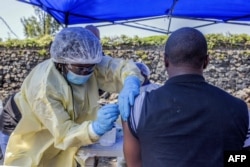In the days leading up to his death, Salomon Nduhi Kambale believed someone had poisoned him. He thought that was the cause of his vomiting blood.
The 30-year-old man would not give community health teams his phone number. Once they found out his number, he would hang up on them.
Nduhi had been infected with Ebola, a deadly and highly contagious disease. Within days, he was dead.
A team of health workers gave Nduhi’s wife and four young children a warning: “If you don’t accept vaccination, you can prepare to die.”
Deep distrust has weakened health officials’ efforts to protect people against Ebola in the country of Congo. Political problems and violence have made things worse. Officials had tried to slow the Ebola outbreak by finding and vaccinating those who may have been in contact with infected people.
Health experts agree that the experimental Ebola vaccine has saved many people in Congo.
But after one year -- and 171,000 doses -- the problem shows few signs of slowing. Ebola has killed more than 1,700 people in Congo. It has spread to the largest city, Goma. Last week, the World Health Organization, or WHO, declared the outbreak a worldwide health emergency.
During the 2014-2016 Ebola outbreak in West Africa, more than 11,000 people died.
Dr. Joanne Liu is president of Doctors Without Borders, a medical aid organization. She said the vaccine is not “the miracle we wanted it to be.”
“The fact that we’ve used so much vaccine, and the epidemic hasn’t stopped, that shows us that contact tracing is not great.”
In contact tracing, health workers identify and reach out to people who may have come into contact with an infected person.
WHO officials say as many as 90 percent of those able to get the vaccine accepted it. But that percentage only includes people who gave contact tracers enough information to be put on a list. The success rate does not include those who distrusted health workers and fled or could not be found.
Health workers have been giving the vaccine to people who were in close contact with a sick person. The workers then give vaccines to people who had been in contact with those people.
But with that method, some people did not get vaccinated until they had already been infected. This increased distrust of the vaccine in communities where public health officials already were seen as outsiders.
“The rumors were if you got vaccinated you would die,” said Liboke Kakule Muhingi. He a 43-year-old farmer in Mangina where the epidemic began last August.
His mother was among the first to die. Six of his sisters also were killed by Ebola. They had cared for their sick mother.
Kakule accepted the vaccine. He made sure his wife and children got it, too.
“If I hadn’t, we’d all be dead,” he said.
In some cases, health teams have been unable to reach areas because of violence or rebel activity.
More often, though, contact lists have failed simply because people have avoided health workers. A religious leader used a false name at health checkpoints to avoid being found, for example. He became the first Ebola case in Goma. The leader had been sickened in one town and took a bus while ill.
The WHO and the Congolese health ministry now are offering the vaccine to anyone who wants it.
With Ebola’s arrival in Goma, some wonder whether there will be enough vaccines if the outbreak continues. Goma is a city of more than two million people.
The vaccine’s maker, Merck, said it has 245,000 1-millileter doses. That could rise to 900,000 over the next 18 months. The dose in Congo also has been reduced to 0.5 milliliters, which doubles the number of available vaccines.
There is a second experimental vaccine, produced by Johnson & Johnson. It requires two doses given one month apart. Health officials in Congo have said it will not be used because it needs more testing and would cause too much confusion.
It is not clear how long the Merck vaccine will protect people. Scientists know from early studies that it lasts for at least one year. The only study to report a longer-lasting vaccine used just a small number of healthy volunteers in Geneva, Switzerland, over a period of two years.
The new plan of giving the vaccine to anyone who wants it involves setting up sites in neighborhoods most affected. Recently, a vaccination team went to the neighborhood in Beni where Nduhi’s wife had stayed after he died.
Baraka Kathembo Makasi is a 22-year-old motorbike taxi driver. He brought his wife and two children with him to the vaccination site.
“At first I refused,” he said, “but I started seeing people die and decided to go.”
I’m Jonathan Evans. And I’m Alice Bryant.
Associated Press writers Al-Hadji Kudra Maliro, Lauran Neergaard, Maria Cheng and Jamey Keaten wrote this story. Alice Bryant adapted it for Learning English. Ashley Thompson was the editor.
_____________________________________________________________
Words in This Story
hang up – v. to end a telephone conversation by cutting the connection
contagious – adj. able to be passed from one person or animal to another by touching
outbreak – n. a sudden start or increase of fighting or disease
dose – n. the amount of a medicine, drug, or vitamin that is taken at one time
miracle – n. a very amazing or unusual event, thing, or achievement
eligible – adj. able to do or receive something
rumor – n. information or a story that is passed from person to person but has not been proven to be true
confusion – n. a situation in which people are uncertain about what to do or are unable to understand something clearly
site – n. a place that is used for a particular activity








